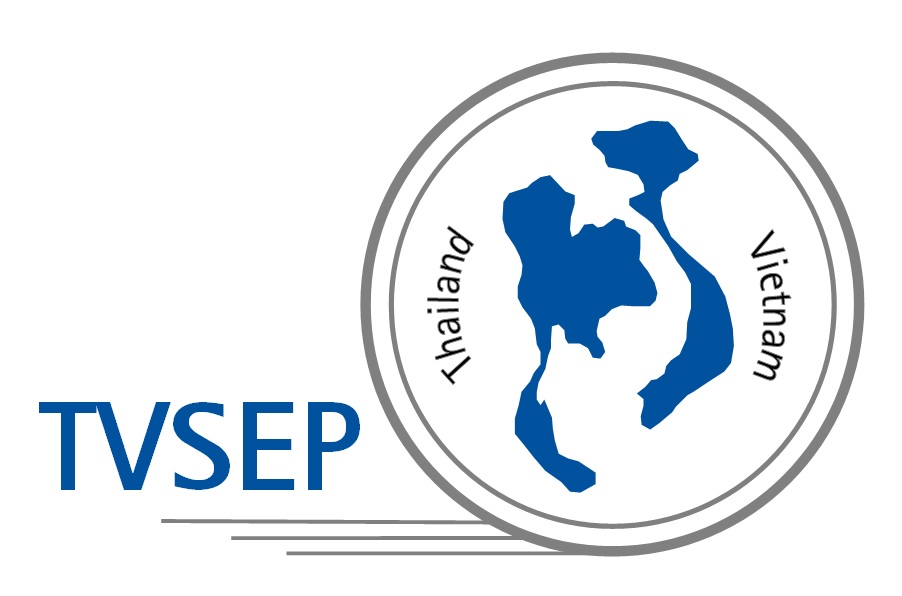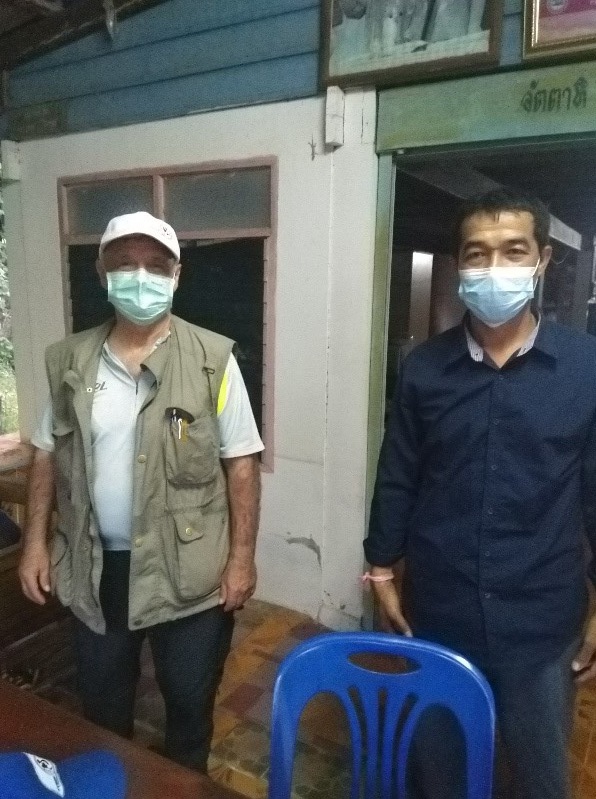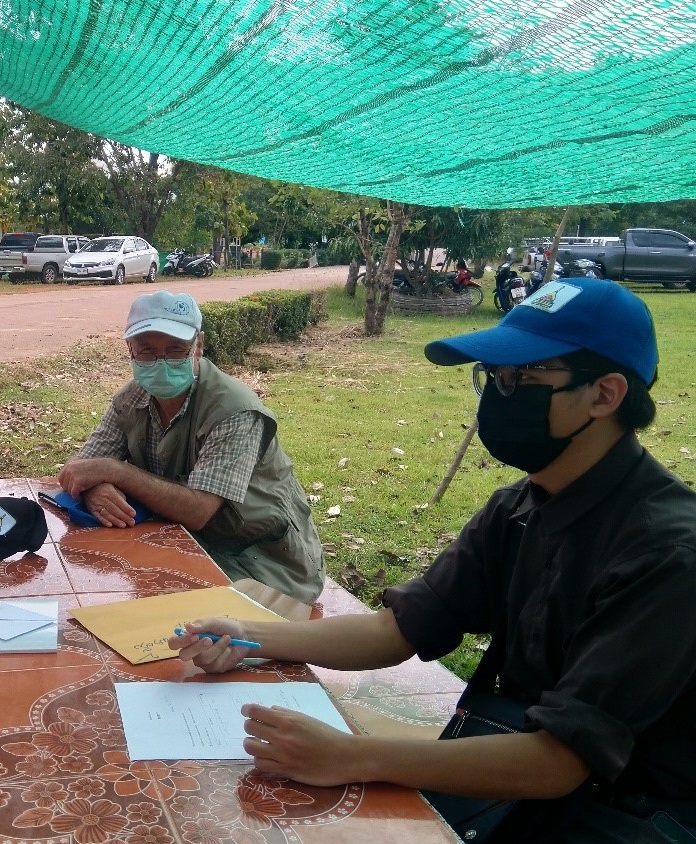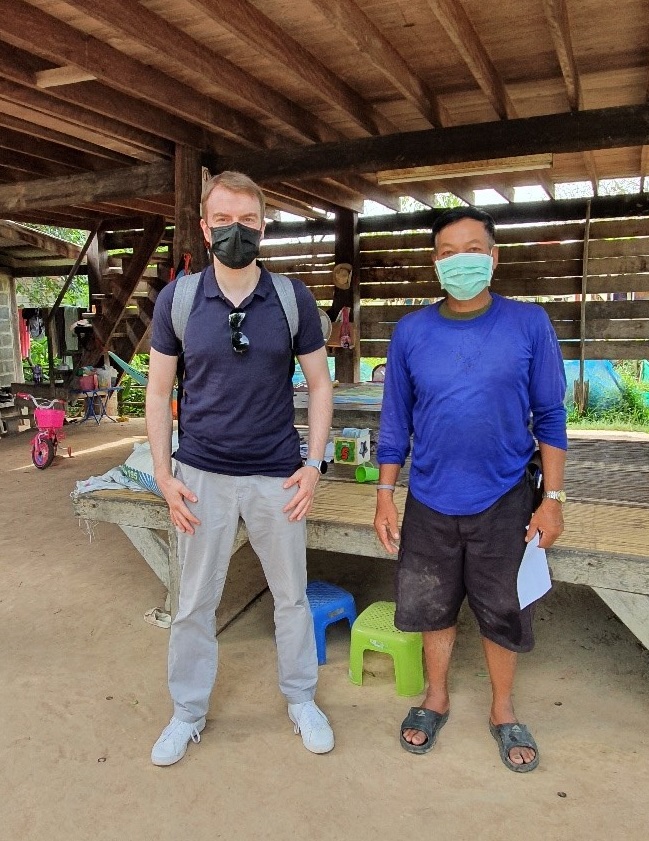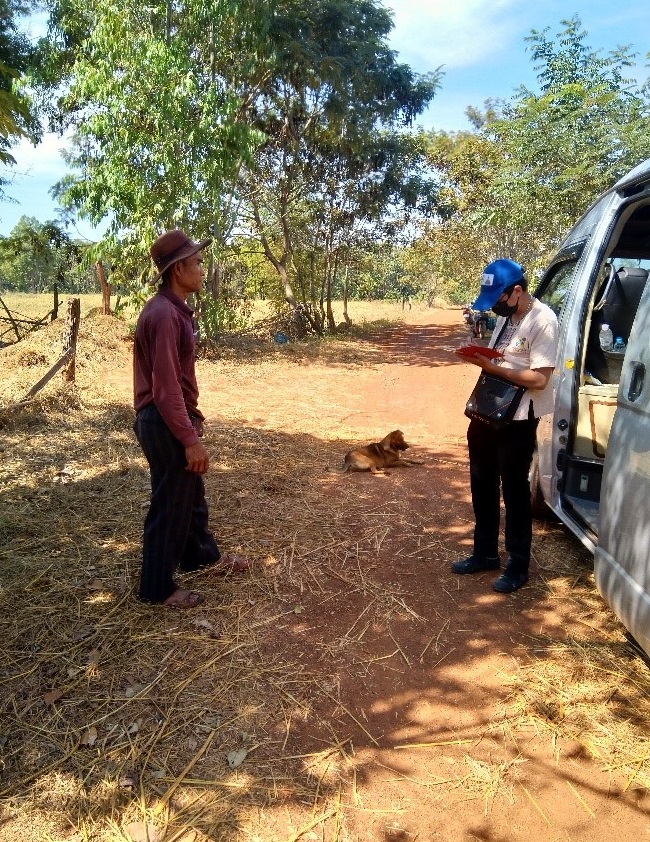Background
In November 2021 a special survey of all 220 TVSEP villages in Thailand was carried out by Prof. Hermann Waibel and Mr. Niels Wendt from LUH together with partners from the TVSEP Data Collection Center at Ubon Ratchathani University (UBU). The purpose of the survey was to update the contact information of village heads ("pu jai baan") and their assistants. This became necessary firstly since phone numbers and other social media contacts of village heads can change frequently due to special offers by phone service providers and/or the change in village head appointments due to election or retirement. Correct village contact information is vital for an efficient conduct of panel household surveys. The survey teams must contact the village authorities by phone before the survey team comes to the village. While village heads normally receive an official letter about the survey from provincial authorities in advance, in some cases the letter did not arrive or got lost. Hence, the survey team leader needs to repeatedly confirm date and time when the enumerator team will visit the village.
The second reason for updating the village data base was that locating the house of the village head can be challenging since villages in Northeast Thailand mostly do not have street names. Collecting the GPS code of the village head’s house will help the driver of the survey team to quickly locate the house and thus avoid losing too much time.
Finally, the purpose of the village visits was meant to be a preparatory measure for the 2022 panel household survey with the aim to maintain a good relationship with the village heads and ensure their willingness to cooperate in facilitating the survey.
Implementation
The survey was implemented between the 10th of November 2021 and 22nd of November 2021 by two teams. A team was headed by an LUH staff member (H. Waibel/N. Wendt) supported by a local enumerator and a driver respectively. The survey started and concluded in the province of Ubon Ratchathani. In the meantime, the teams split up, one completing the province of Buriram, the other completing the province of Nakhon Phanom.
Data was collected using a tablet based questionnaire, running the world bank software "Survey Solutions".
The questionnaire developed for this survey was very brief, only containing basic information and using English language (no Thai translation). The interview was scheduled for a maximum duration of 10 minutes and on average took around five minutes. The respondent’s phone number was called immediately to check for correct information. No further plausibility or completeness checks were implemented in the tablet. Instructions on the tablet questionnaire stated that data of at least three people had to be collected. Options were given to collect information about three types of village officials: Village Head, Assistant Village Head and any other members of the village, mostly, however, members of village committees, etc. For each respondent, the following information was obtained:
- [Name]
- Age of [NAME]
- Gender of [NAME]
- If not Village Head or Assistant -> Function of [NAME] in the village
- If Assistant Village Head -> Was [NAME] appointed by the village head or elected?
- When was [NAME] elected? – Year
- When was [NAME] elected? - Month
- Is [NAME] temporarily or permanently appointed?
- When is the next election? - Year
- When is the next election? - Month
- Does [NAME] intend to be reelected again?
- Telephone No. of [NAME]
- GPS coordinates
Results and findings
The conduct of the survey was smooth and went without problems. Village representatives were friendly and cooperative and received the TVSEP team with great hospitality. Occasionally, village heads asked for Covid-19 vaccination status of the TVSEP team. All interviews took place outside the respondents’ house, following proper protocol, such as wearing face masks, keeping distance and using disinfectants.
Generally, it was observed that Covid-19 infection rates in rural villages in Northeast Thailand were low at the time of the survey, although occasional outbreaks and lock-downs were experienced. The responsibility of village heads during Covid-19 was a frequent “small talk” topic before or after the actual interviews. It was remarkable to learn that village heads played an active role in implementing response measures at the local level against the pandemic. We found many villages where the village heads drove villagers with limited mobility to communal vaccination centers. Frequently, vaccination rates in the village of 80 % were reported, much higher than those in Bangkok and other major cities in Thailand.
Another discussion topic on the site was the development of village infrastructures, including for example, IT, and issues like waste management. Here we found a large variation in the general appearance, the advancement and development dynamics of the villages. A popular topic also was foreign residents in the village. It was interesting to learn that in most villages up to five persons from European countries or the US are permanently or temporarily living. The side-talks were an important inspiration for topics to be included in the village head questionnaire to be carried out during the 2022 panel survey. A small gift for the respondent at the end concluded the visit which took place in a pleasant atmosphere. In conclusion, the TVSEP panel seems to be well-established among its panel villages thus giving hope for the panel’s longevity.
Selected statistics
In the following we present some statistics derived from the data collected.
Figure 1 shows age of the village heads by gender. Majority of village leaders are male while about 20 % are female (which is perhaps still higher than in rural Germany). As regards age, majority are at least 50 years old, most of them in their mid and late fifties.
An interesting result is that all village heads in the sample are not subject to periodical reelection. Rather, once elected, they remain in this position until retirement which in Thailand is at the age of 60. The only reason for a shorter term of office is that the village head quits his job prematurely due to various reasons. Figure 2 shows the actual years of being in office of our TVSEP village heads. About 17 % have been in office two years or less and about 21 % up to five years. 28 % have between five and ten years leadership experience while another 34% were in office more than 10 years. The longest serving village head was in Buriram province is 56 years old and has been in office for 26 years already.
In Figure 3, we show the age distribution by gender for the assistant village heads. Here we can see that the share of female is almost at par with male. Also assistants are generally much younger than their boss. This is perhaps not surprising, but it indicates that the younger generation may gradually assume political and administrative responsibilities in the rural as in many cases assistants will become elected as village head after retirement of the old village head.
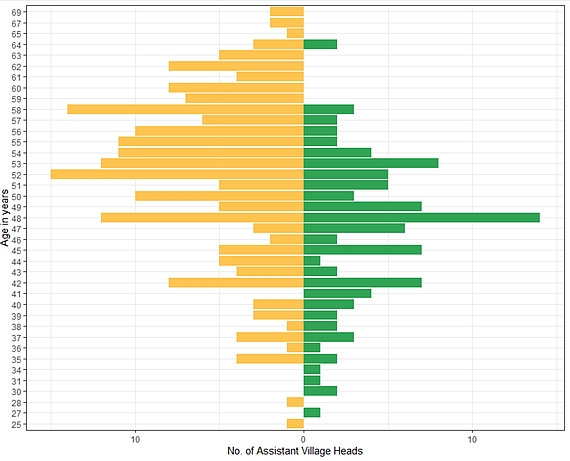
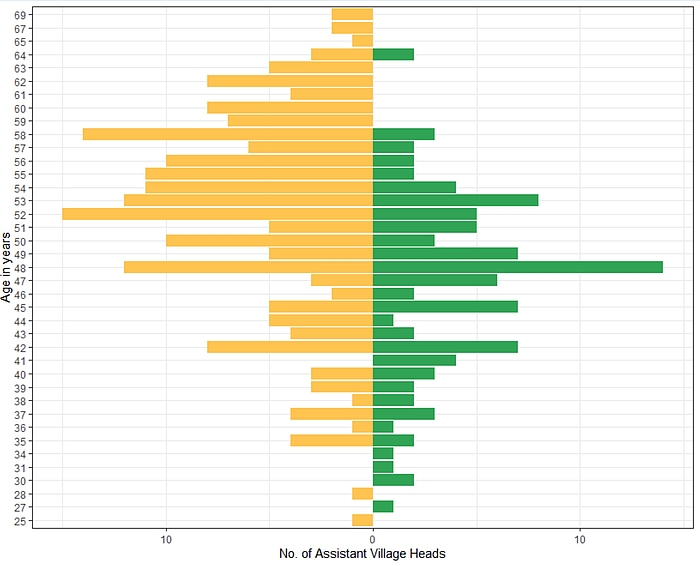
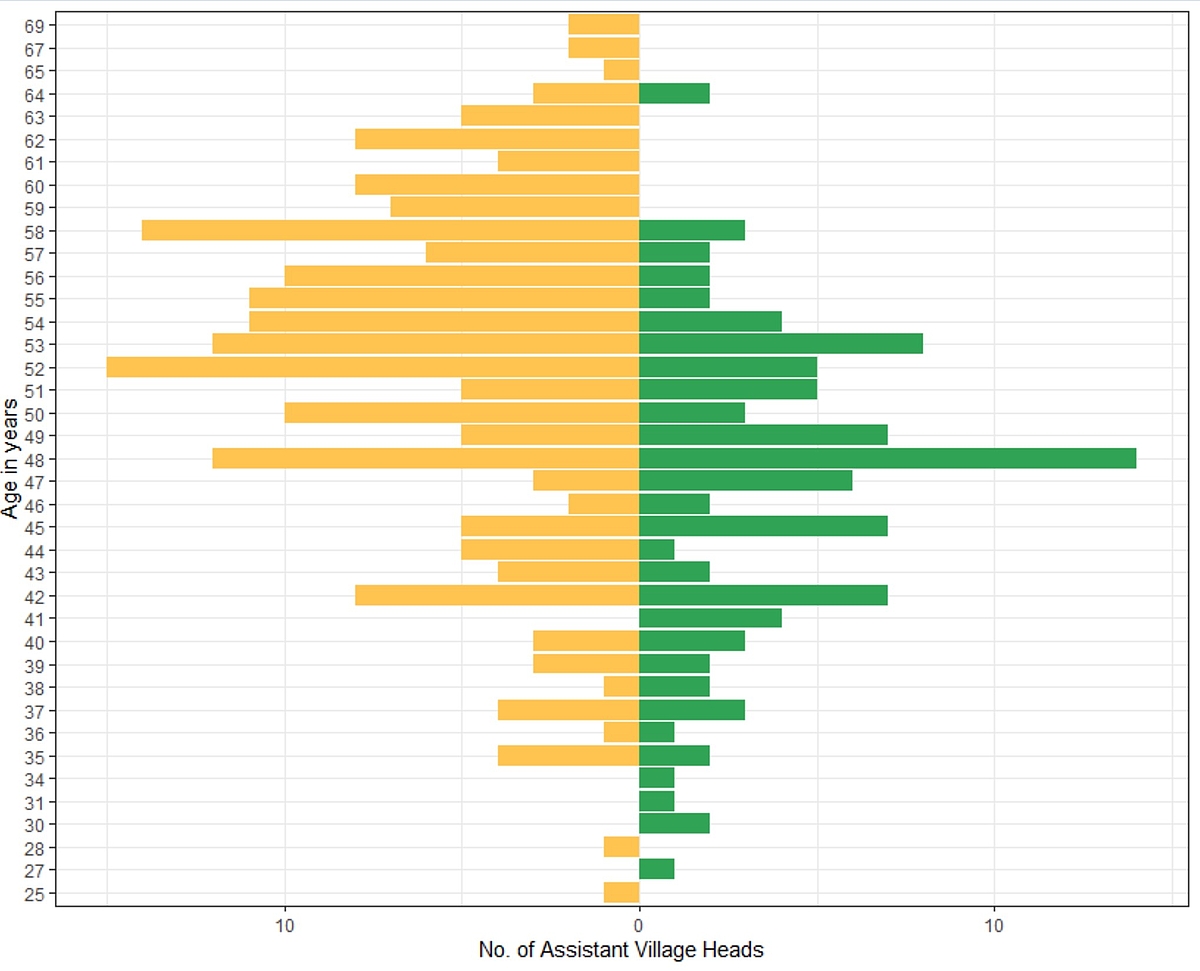
Selected photos
The following four photos are meant to give some illustration of the field implementation of this project activity. As can be seen on all photos preventive Covid-19 measures were strictly followed.
Photo 1 shows H. Waibel with a village head in front of his house. In photo 2 the interview took place outside of the community center of the sub district. Photo 3 shows N. Wendt with village head underneath his typical Thai country house, and photo 4 shows enumerator Mr. Bank undertaking the interview in the field as it was rice harvesting time. Most village heads are indeed also part-time farmers.
